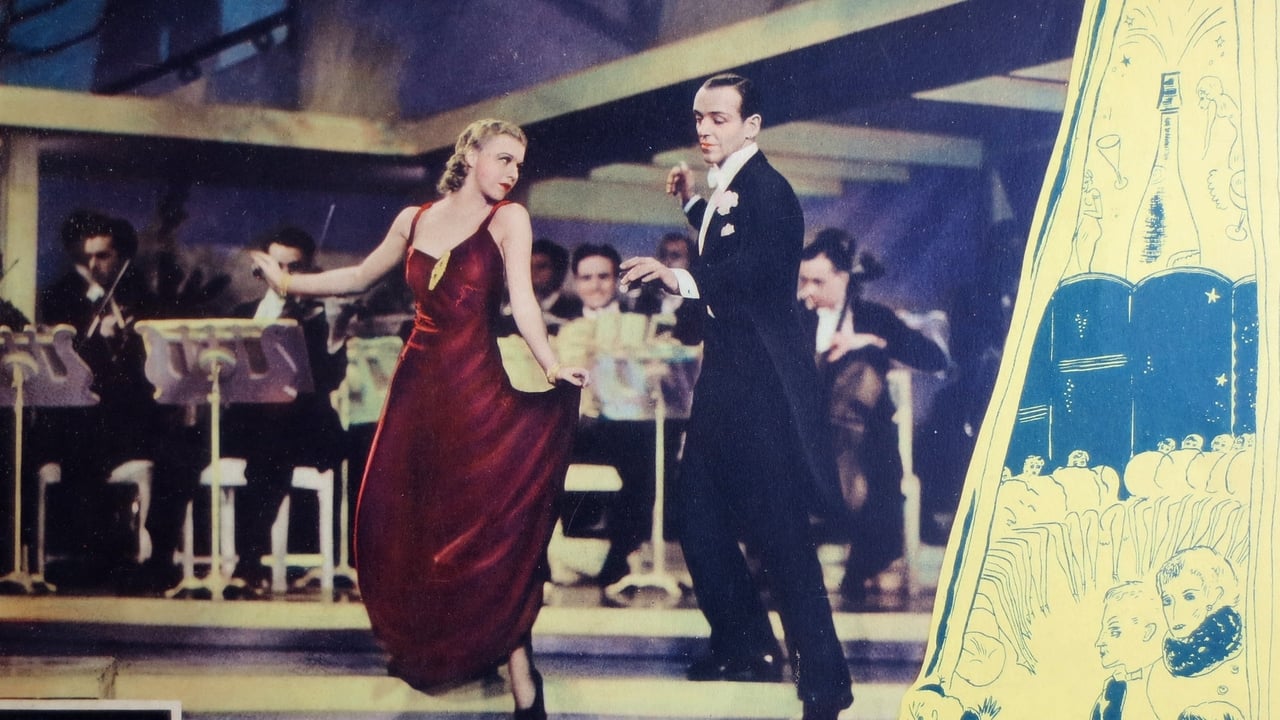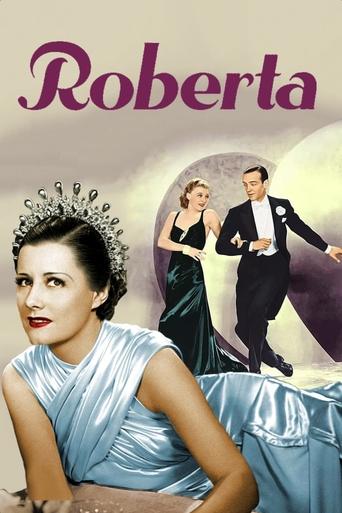SpecialsTarget
Disturbing yet enthralling
Doomtomylo
a film so unique, intoxicating and bizarre that it not only demands another viewing, but is also forgivable as a satirical comedy where the jokes eventually take the back seat.
Mischa Redfern
I didn’t really have many expectations going into the movie (good or bad), but I actually really enjoyed it. I really liked the characters and the banter between them.
Phillipa
Strong acting helps the film overcome an uncertain premise and create characters that hold our attention absolutely.
Charles Herold (cherold)
I wasn't sure what to expect after reading some IMDb user reviews. Many were disappointed that this wasn't an Astaire-Rogers vehicle, as they played second fiddle to Irene Dunn, while others said it was delightful. I fall into the second camp.Regardless of the billing, this is very much in the style of Astaire musicals, with a silly story, romance fueled by misunderstandings and second-character manipulations, and wacky characters. While Dunne has top billing, there is a lot of Astaire and Rogers, showing off their chemistry on and off the dance floor. The songs are first-rate and the dancing is excellent.The Dunne/Scott seems fine to me. It's dumb, like most musical romances of the time, but the pair is fairly likable. I could do without Dunne's operatic-ish version of Smoke Gets in Your Eyes, but that opera-ish thing is something fans of 30s musicals either like or have learned to live with. It's glossy, there are some surprisingly witty lines for this genre, and I was happy to discover an Astaire movie I had somehow never seen before. Recommended.
seasoningspice
Fred Astaire and Ginger Rogers. To most, the names conjure up certain films: Top Hat, Swing Time, Shall We Dance. FG have a surprisingly large amount of "unknown" films, some of which arguably deserve their status, some of which arguably don't. Roberta is one of the latter. To me, it's the most undeservedly underrated of the FG films.Roberta doesn't emphasize the FG partnership. They are, like Follow the Fleet, the "second fiddle" couple. It could be called only technically a FG film; however, in the limited screen time they have, Fred and Ginger create a believable relationship, breathing life into their characters. That's the most important part of Roberta - its characters, as frothy as they may be, feel alive.Roberta is not like any of the popular FG films. It's not a silly confection brimming with antics. It has no Edward Everett Horton, Victor Moore, or Erik Blore. Of course, there isn't anything wrong with the silly confections - I enjoy them myself - but the added dimensions of Roberta give it that special life. It has poignancy, for all its fluffy subject matter. Like milk chocolate sprinkled with salt, it doesn't leave an overly sweet aftertaste; instead it leaves a sense of warmth because its happy ending feels real.On to the actors, starting with Irene Dunne. Roberta is the only film with Irene I've watched, and she impressed me. Apparently, she's known as a talented comedienne; however, her dramatic moments were what left an impact. The way she handled herself spoke volumes about her character, and never verged on the stereotypical. I sympathized with and liked her. She held her own but wasn't painted as disagreeable or illogical. Her singing was sweet, fit the songs, and didn't seem unrealistic (since it was her real voice!).Randolph Scott was also a pleasant surprise. My first exposure to him was in Follow the Fleet, where I disliked him, and so I was expecting the worst from his character in Roberta; but he was, as the script says, a big goofy Newfoundland. He played the role well! His character is a naive, somewhat sheltered man from inland America, and it shows. His opinions and behavior make sense given his background. Even in his more disagreeable moments I wasn't annoyed with him - rather, he was endearing.As a couple, John and Stephanie have more chemistry than might be expected. At their first meeting you can easily see their interest in each other. He's naive while she's sophisticated, and their personalities do clash eventually, but it's not fueled by blatant clichés. Even their reconciliation takes a bit of time. I also never got the feeling that either would control the relationship: they felt like equals.Fred plays, as he often did, a musical character, and does it with his usual aplomb. There's never much to say about his characters, but I will say that his sass comes across brilliantly - he gets many snappy lines and delivers them beautifully.Ginger is proof of how Roberta veers away from the usual storytelling clichés. At first glance, she's playing a Polish countess; very early on, Fred discovers she's an old friend of his, but this is never exploited for any hijinks. Ginger retains her persona, drops her guard around Fred, does a great job with both roles, and that's that. She has a chance to play both broad (as the countess) and subtler (as herself) comedy, which gives her more detail than the accented comedic hothead she at first appears to be.FG utilize the old-acquaintance part of their characters to great effect. One of the greatest numbers in the film is I'll Be Hard To Handle, which begins with FG chatting humorously about growing up back in the US. You feel they really did know each other, really are getting reacquainted. Both of them speak frankly about the relationship, and when things develop further, it feels entirely natural. What's more, there are no dramatic kisses or embraces - the relationship feels real. It's different than the main relationship but equally plausible.There aren't many supporting characters, outside from John's aunt Millie, his old flame the rich society girl, and a few others. None of them get much to do, but there's really only one character who stands out as being particularly stereotypical - the owner of a Parisian nightclub, who invited Fred's band over thinking they were (Native American) Indians rather than "Indianians" and yells about this almost every time he appears. But hey, the rest of the film makes up for his antics.Outside of the cast, the score is the main highlight. Jerome Kern's songs provide almost all of the film's poignancy. Even Lovely To Look At has a soft, fond edge. Yesterdays, sung by Irene in a pivotal scene, is one of the saddest songs found in an F&G movie: about the tragedies of lost youth, time, innocence and joys, it isn't at all overdramatic. Smoke Gets In Your Eyes is similar; the arrangement that plays during the penultimate FG dance number is one of my favorite instrumentals in a film. One of the weaker songs is actually an upbeat one, Let's Begin, performed by Fred; but the film doesn't lack good upbeat numbers. I'll Be Hard To Handle is catchy, cute, and leads into a lovely number, while I Won't Dance is enjoyable too.It's difficult to sum up my love for Roberta. It's like comfort food, but without that guilty-pleasure edge. It's got a witty dialogue; pretty sets given life by the acting; FG, both playful and romantic in dancing; a sympathetic main relationship that steers clear of clichés; humor balanced by poignancy, tragedy balanced by success, heartbreak balanced by romance. It's got lovely music, beautiful people, a world you want to live in. It glows. Roberta is unique and underrated.
atlasmb
While watching "Roberta", I felt I was on a roller-coaster of highs and lows.The stars--Irene Dunn, Fred Astaire, Ginger Rogers and Randolph Scott--are heavy hitters. I enjoyed most of their performances, but I felt that Scott portrayed his character as too much of a lunk, so I found that distracting. Astaire and Rogers are wonderful, as usual. One might hope for more dance numbers. Those included are fantastic. When Fred dances alone in this film, it is easy to compare his style to Gene Kelly's. Fred packs in so many different dance steps, while Gene is more of a straight ahead hoofer (who likes to athletically exploit his environs). The story serves as little more than an excuse for dance numbers, songs and fashion. The fashion is one of the highlights of the film and worth the price of admission.The soundtrack is afflicted with two songs that were extremely popular. "Smoke Gets in Your Eyes" is a great orchestral number, but when sung it really reveals its weaknesses. The tune is boring and made nearly unbearable when sung with a very high voice, like Irene Dunn's. "Lovely to Look At" is one of my least favorite songs, with a perfectly fine waltz tempo that is marred by sections reminiscent of a cartoon ditty. When sung by Irene Dunne--or almost anyone--it grates.The sets are amazingly complex and stylish, further emphasizing the wonderful fashions in this film.
richard-1787
I enjoy the mainline Astaire-Rodgers musicals. They have a certain grace, shine, and wit to them that always makes for an enjoyable hour and a half, usually accompanied by great music.Roberta is somewhat different from the standard formula, though. As with Flying Down to Rio, Astaire and Rodgers aren't the lead couple here. Whereas in FDTR the main couple was not particularly interesting, however, at least for me, here they, or at least the female half of it, Irene Dunne, are outstanding. Her performances of "Yesterdays," "Smoke Gets in Your Eyes," and, to a lesser extent, "You're Lovely to Look At," are beautifully sung - yes, she's not dubbed - and acted, and real highlights of any movie. She was a great actress, and between her and Helen Westley, who does a great job with her small role at the beginning of the picture, the two give the movie a quality serious side that makes Astaire-Rodgers look that much better for the contrast - very much along the lines of the Silver Age Viennese operettas of Lehar and Kalman of which this is something of an echo. Dunne had played the role in the successful touring company of the show before the movie was filmed, so she knew the part and how to play and sing it well, and that benefits the movie.And Randolph Scott is perfectly good in a very two-dimensional role as the mid-Western American who is offended by the sexier aspects of French culture - which, however, is not portrayed as in any sense too outrageous.An exceptionally good 1930s musical. Not all fluff, but the fluff too is excellent.

